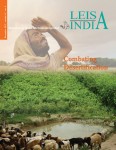/topics/water-management
Water Management
Moving from paddy and sugarcane to less water-intensive crops such as oilseeds, pulses and millets can help resolve the Cauvery water dispute
Posted on 14 Jan, 2013 12:10 AMWhat happens when two or more states are dependent on same water resource for agricultural purposes ? Do the states compete for the resource or are their needs sufficiently different from each other? What are the consequences of the competition for this precious resource?
This article sheds light on the dispute between Karnataka and Tamil Nadu, for sharing Cauvery river water. The ongoing tussle between the two states has seen a lot of unrest amongst farmers in form of dharnas, protests, rail roko and non-cooperation by citizens, and disagreement with the agreements made by their respective governments and unending negotiations by governments involved, to come to a mutually agreeable decision.
Traditional diversion-based phad irrigation systems help mitigate risk of crop failure in the drought-prone farmer suicide belt of Vidarbha, Maharashtra
Posted on 11 Jan, 2013 11:56 AMMany of these systems (1) continue to function and are often more sustainable, cost-effective and successfully managed by local institutions. Phads are one such community-based and managed diversion irrigation management system (2) prevailing in the north-western part of Maharashtra and date back to the early 16th century as per historical accounts. The system is prevalent in the Tapi basin on rivers the Panjhra, Mosam and Aram in Dhule and Nashik districts (3).
Phads or diversion-based irrigation systems, are being revived and promoted in Vidarbha region of Maharashtra by Dilasa, a Yavatmal-based voluntary development organisation (Video courtesy: Dilasa)
Increasing rice yields and saving water: Lessons for policy and practice: Bi monthly update from SRI-India Network for November - December 2012
Posted on 11 Jan, 2013 07:50 AMIncreasing rice yields and saving water: Lessons for policy and practice - The System of Rice Intensification (SRI)
Report on Greening of the NRDWP: News and Policy Update from India WASH Forum e-Newsletter-Dec 2012
Posted on 11 Jan, 2013 07:44 AM Gender in WASH: Misplaced perspective in WASH sector
Gender in WASH: Misplaced perspective in WASH sector
Moving from local Government provision to private sector participation: Reforming water supply in Mumbai, Maharashtra
Posted on 09 Jan, 2013 08:23 PMUrban infrastructure is poised for some major changes in the country with the current trends of rising levels of urbanisation. However, both Urban Local Bodies (UBL) and water utilities are not fully prepared to meet with the challenge due to their dependence on old governance structures based on public management.
Sand mining – An unexamined threat to water security
Posted on 09 Jan, 2013 08:12 PMSand is a resource whose economic value belies the crucial role it plays in our lives. The process of development in India has so far not taken into account the environmental and social consequences of indiscriminate sand mining.








